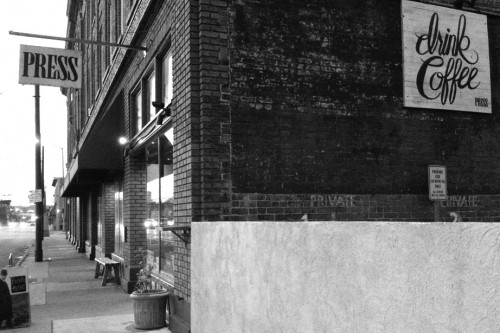The best coffeehouse in the United States isn’t located in Seattle, Portland, New York City, or any of the usual suspects: Press Coffee Bar is nestled between a parking lot and a sewing shop, across the street from a pair of abandoned warehouses and beneath several stories of old brick apartments in Dayton, Ohio—the birthplace of aviation, the cash register, and hundred-spoke gold rims.
I was sitting in Press recently, tucked in the back, enjoying a black coffee, a subtle milieu of roasted beans and Radiohead’s OK Computer in the atmosphere around me. Back in Dayton for a spell, I was spending a lot of time there dotting the I’s and crossing the T’s in our most recent book, Everything That Remains.
The shop’s tattooed proprietors, Brett and Janell Barker, were, as usual, hard at work behind the counter. The Barkers, a husband-and-wife duo, are wonderful in more ways than one: friendly, attentive, passionate, and sticklers for detail. From the wood floors and wood-paneled walls, to the music and changed-monthly local-art installations, everything at Press is carefully and intentionally curated. Not to mention a handful of employees—Caleb, Awni, Brenden, Eric—who feel much more like family than staff, and customers who seem to embody a Cheers-esque camaraderie.
Then there’s the coffee, of course: sourced from only the best roasters and brewed or pulled so carefully—so meticulously—it resembles art much more than foodservice. All of which culminates in the perfect coffeehouse: elegant, unpretentious, simple.
The simplicity of Press transcends the shop itself: not simple for the sake of being simple, Press is simple because they’ve eliminated the excess in favor of the essential. It was Brett, after all, who convinced me to do the same with my coffee.
I used to load my cup of joe with heaps of cream and sweetener until it was more a weak, milky, calorie-laden dessert than a drink. As I stirred in the excess, Brett would quietly rib me, encouraging me to enjoy the flavor without the additives.
I didn’t listen. Not at first, at least—not until the day when they ran out of my sweetener of choice, and I was forced to go without. It was an unpleasant shock at first—drinking only coffee and cream—but soon my taste buds adjusted. I could better taste the coffee, and I went without sweetener from then on.
A month later, being the experimenter I am, I wondered what my coffee would taste like without milk, so I ordered an Americano and shook my head when Janell asked whether I wanted room for cream. Being unacclimated, the first sip was bitter—a strong punch to the palate. A few days in I acquired the taste, and for the first time in my life I could taste the actual coffee. It was more delicious than any of the sugary, weak, milky cups of yesteryear, and I never went back.
Black coffee is a synecdoche for life: when you eliminate the excess—when you deliberately avoid life’s empty calories—what remains is exponentially more delicious, more enjoyable, more worthwhile. It might be a bitter shock at first; but, much like coffee, a meaningful life is an acquired taste. Sip slowly and enjoy.
Read this essay and 150 others in our new book, Essential.

